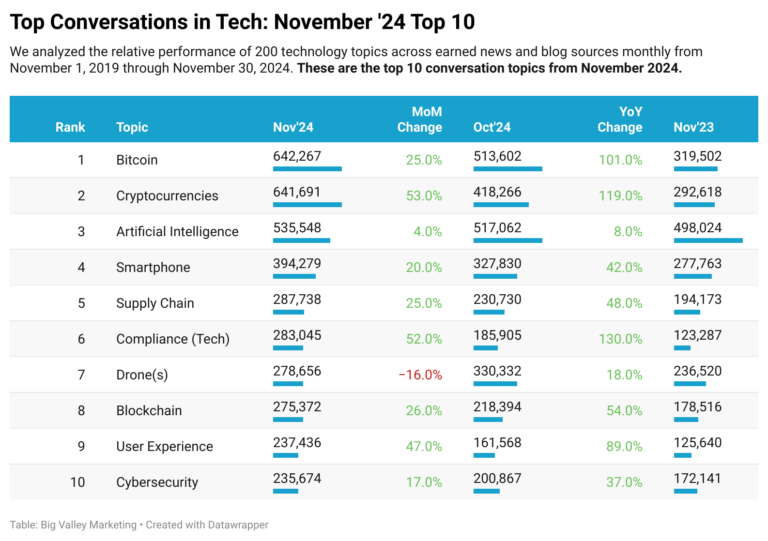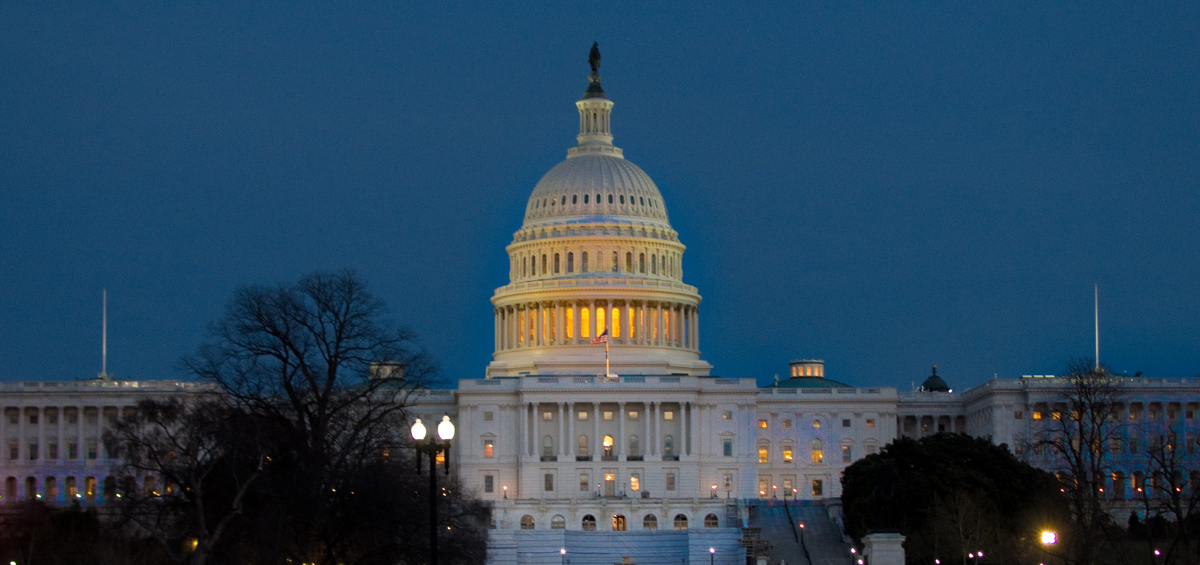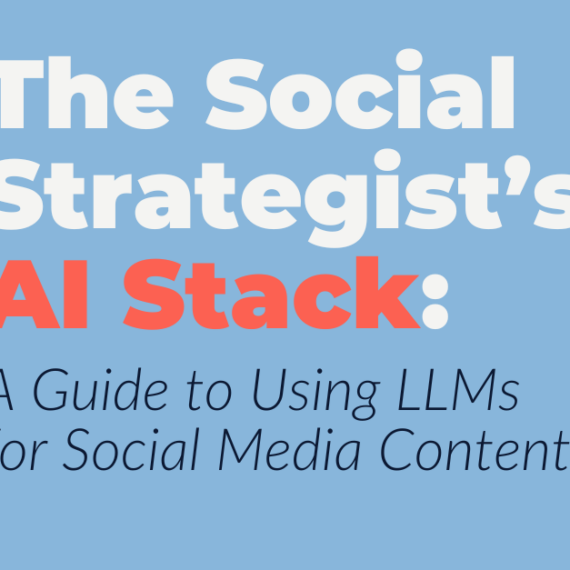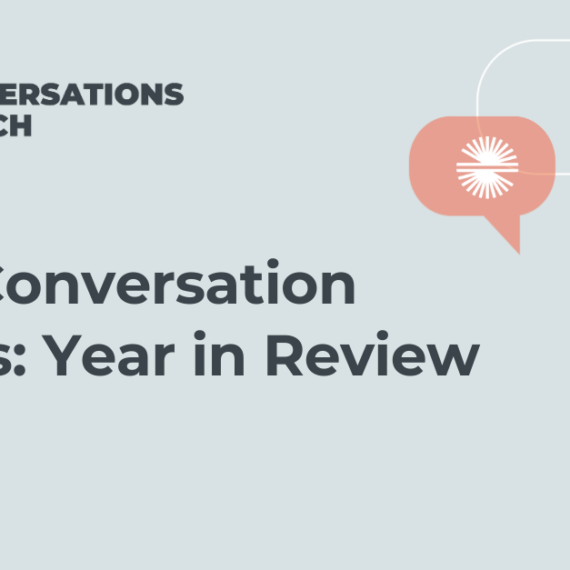The Predicted Impact of Trump 2.0
Welcome to Top Conversations in Tech, where we isolate the hottest trends, falling stars and shifting market dynamics to help technology marketers maximize their relevance. This month’s data reflects news and blog citations in November 2024 versus October 2024 and November 2023. We currently monitor 270+ topics, with data and insights going back to March 2019.
The election may be over but the effects and speculation of what the next four years might entail has just begun. Key topic areas like cryptocurrencies, supply chain, AI, and more have already garnered coverage around questions “what would a Trump administration look like?” and “how could Trump’s administration impact businesses?” In this TCiT, we’re taking a deeper look at the top three conversations: #1 Bitcoin, #2 Cryptocurrencies, and #3 Artificial Intelligence.
 #1 Bitcoin (642K) and #2 Cryptocurrencies ( 641K) received the most coverage for November, increasing 25% and 53% month over month respectively, and, once you get past the typical coverage (“should you invest?” and “investment scam”), the potential impact of the Trump administration was forefront. Indeed, outlets reported on the market surge following Trump’s electoral win, including speculation about a potential Bitcoin reserve. Some crypto activists alleged that the acquisition of tokens could positively impact the national debt—if they were held onto long enough, of course. As seen through these two examples, the Trump win has reinvigorated conversations around the potential impact of cryptocurrencies, like Bitcoin, on the American economy.
#1 Bitcoin (642K) and #2 Cryptocurrencies ( 641K) received the most coverage for November, increasing 25% and 53% month over month respectively, and, once you get past the typical coverage (“should you invest?” and “investment scam”), the potential impact of the Trump administration was forefront. Indeed, outlets reported on the market surge following Trump’s electoral win, including speculation about a potential Bitcoin reserve. Some crypto activists alleged that the acquisition of tokens could positively impact the national debt—if they were held onto long enough, of course. As seen through these two examples, the Trump win has reinvigorated conversations around the potential impact of cryptocurrencies, like Bitcoin, on the American economy.
However, in taking a step back, one can easily start wondering about the overall reputation of bitcoin and cryptocurrencies. Do brands need to worry? Just like any topic, framing is crucial to getting across a message, reaching an audience, and, ultimately, success. And, while there are some articles about basic investment opportunities, a lot of top coverage or key narratives each month revolve around fraud and, now with the election, have become tied to politically-influenced economic narratives.
The question then becomes, how do organizations navigate this space—one that wreaks of fraudulent behavior in the form of bad actors and became tied, politically, to cabinet discussions for the upcoming presidential term? The answer: pay attention to what, and how, the topic is associated with other narratives. For #1 Bitcoin and #2 Cryptocurrencies this includes perceptions that change as a result of fraudulent behavior, how the upcoming administration will engage with the cryptocurrency market and, funny enough, what “modern art” cryptocurrency moguls buy—check out this banana story (it received 3K stories alone).
#3 Artificial Intelligence (535K) dropped from its #1 status in October 2024 due to the conversation about #1 Bitcoin and #2 Cryptocurrencies. Despite falling from #1 to #3, AI coverage still increased by 4% month-over-month. Unsurprisingly, the topic of AI still generated similar Trump administration coverage, ranging from a potential repeal of Biden-era AI policies to an appointed “AI Czar.” While journalists and tech contributors alike debate about Trump’s impact on AI, some outlets have highlighted pointed statements made by brands, like LinkedIn. Co-founder of LinkedIn, Reid Hoffman, spoke out regarding the alleged conflict of interest between Musk “guiding” Trump’s AI policies, leading to a headline quote from Business Insider, “Elon Musk has a ‘serious conflict of interest’ due to xAI and his relationship with Trump, LinkedIn cofounder says.” What is fascinating about the coverage is its inception—originally, Hoffman wrote an op-ed piece for The Financial Times.
The relationship between these pieces (1) reinforces the power of original, penned content from brands and (2) suggests that perhaps, brands don’t speak out often or pointed enough about AI regulation (given that Business Insider took a page from the Hoffman piece in The Financial Times). Oh, should I mention that, according to Business Insider, Hoffman and Musk have been “bitter rivals” for close to a decade? And that Hoffman co-founded InflectionAI?
The Bottom Line
- The presidential election speculation has begun and, in an era of uncertainty and powershifts, brands should monitor the perceptions around key topic areas. Right now, with cryptocurrency and bitcoin, we see economic questions driven by politically motivated questions regarding the new administration? Sans politics, we also see issues with fraud and off-kilter banana stories. Brands need to recognize that these stories inform the modern consumer and, as a result, shape their perceptions of industries. When engaging in communication around these efforts, build the context but recognize (and monitor—always monitor) that brand efforts might be seen in conjunction with more off-kilter or controversial subtopics.
- The media watches. Period. In a world where thousands and millions of pieces of content are at consumers fingertips, remember that journalists, too, are looking for stories, angles and unique perspectives. Does this mean that brands shouldn’t engage in activities and, when they do engage, it should be a high-level engagement? Absolutely not. However, similar to the aforementioned point, content may be repurposed into a broader story. Thus, organizations should take part in iterative self-reflective meetings to identify weak or soft points. For example, when speaking out about artificial intelligence, what might media bring to the story?
Overall, November coverage spiked from October following the presidential election. Will we see a fall in December content due to the holiday season? Will coverage reflect the hardships many feel during that time? Does anyone anticipate a “how AI can make your holiday shopping easier” article? Come back in January to see how the top conversations in technology fared to close out the 2024 year.
Check out previous installments of Top Conversations in Tech here.






